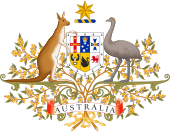This article needs additional citations for verification. (November 2024) |
| Immigration Restriction Act 1901 | |
|---|---|
 | |
| Parliament of Australia | |
| |
| Citation | No. 17 of 1901 |
| Enacted by | Australian House of Representatives |
| Royal assent | 23 December 1901 |
| Commenced | 1901 and 1958 |
| Repealed | 1 June 1959 |
| Legislative history | |
| Bill title | Immigration Restriction Act 1901 |
| Introduced by | Edmund Barton |
| First reading | 5 June 1901 |
| Amended by | |
| Immigration Acts 1905-1949 | |
| Repealed by | |
| Migration Act 1958 | |
| Status: Repealed | |
The Immigration Restriction Act 1901 (Cth)[1] was an Act of the Parliament of Australia which limited immigration to Australia and formed the basis of the White Australia policy which sought to exclude all non-Europeans from Australia. The law granted immigration officers a wide degree of discretion to prevent individuals from entering Australia. The Act prohibited various classes of people from immigrating and provided for illegal immigrants to be deported.[2]
Because of opposition from the British government, more explicit racial policies were avoided in the legislation, with the control mechanism for people deemed undesirable being a dictation test, which required a person seeking entry to Australia to write out a passage of fifty words dictated to them in any European language, not necessarily English, at the discretion of an immigration officer.[a] The test was a pretend or fake one as it not designed to allow immigration officers to evaluate applicants on the basis of language skills, rather the decision that a person was a “prohibited immigrant” was already taken when the “test” was to be administered and the language chosen was always one known beforehand that the person would fail. This pretend was well recognised at the time as Senator Harney of Western Australia expressed it:
“The Government had placed itself on the horns of a dilemma, as, if the Bill were honestly administered, it would be inept, and, if not honestly administered, it would involve Parliament and its officers in a piece of gross chicanery.” The West Australian, 14 November 1901, p.3.
While the initial bill was based on similar legislation in the Colony of Natal which later became part of South Africa, unlike that and similar Education Tests elsewhere, passing was not possible.[4]
The Act was replaced by the Migration Act 1958.
- ^ "Immigration Restriction Act 1901". Federal Register of Legislation. Office of Parliamentary Counsel (Australia). 23 December 1901.
- ^ "Immigration Restriction Act 1901 (Cth)". Documenting a Democracy. Museum of Australian Democracy. Retrieved 7 November 2016.
- ^ A. H. Charteris, "Australian immigration laws and their working", in Norman MacKenzie (ed.), The legal status of Aliens in Pacific countries, Oxford: Oxford University Press, 1937, p. 30.
- ^ "The Establishment of the Immigration Restriction Act". Australian Broadcasting Corporation: Australia's Centenary of Federation. Archived from the original on 12 December 2004.
Cite error: There are <ref group=lower-alpha> tags or {{efn}} templates on this page, but the references will not show without a {{reflist|group=lower-alpha}} template or {{notelist}} template (see the help page).